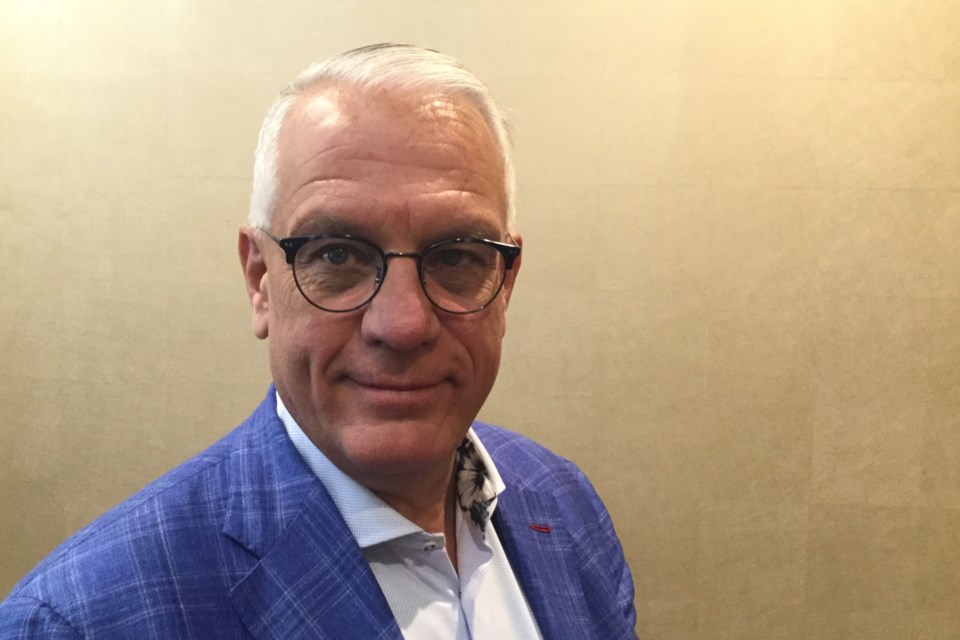The average wage at the Noront Resources ferrochrome processing facility in Sault Ste. Marie will be $108,000, Stephen Flewelling, the company's chief development officer told a Sault audience.
“These are extremely well-paying jobs," Flewelling told a chamber of commerce luncheon crowd, July 26.
"The average job that's created in Canada today is about $52,000. In our economic assessment for this plant, the average job is $108,000 a year."
Noront expects to have between 1,000 and 1,500 workers on site during the three years it will take to build the Sault facility, which will eventually employ more than 500 permanent staff.
"Driving the chrome ore down to Nakina, railing it from Nakina to Sault Ste. Marie, producing it in Sault Ste. Marie and sending it on a barge to the U.S. customers, we believe we can produce that ferrochrome for about 60 cents a pounds, doing all that work," Flewelling said.
At the current price for ferrochrome on the U.S. market, $1.40, that would produce annual revenue of almost $1 billion Canadian.
And that's just the first step of Noront's plan, using a Sault workforce of 300 to 400 workers. The company wants to eventually double its production as the market allows.
"You can see an outstanding multi-billion-dollar business per year, for a hundred years," Flewelling said.
Want to read more stories about business in the North? Subscribe to our newsletter.
In May, Noront chose Sault Ste. Marie as the future home of its ferrochrome processing facility, selecting the Sault over Timmins, Thunder Bay and Sudbury. The Sault facility will process ore from the Ring of Fire metals camp in Ontario's James Bay Lowlands.
Chrome is used in every piece of stainless steel produced in the world, but no chrome is made in North America.
"In fact, there is only one other small chrome producer in North and South America, so all the chrome that's supplied for the U.S. stainless business comes from primarily either South Africa or Kazakhstan," Flewelling said.
Chromium facilities in those two countries are primarily powered by coal.
"We want to take about half that market. Right now that market is around 500,000 to 600,000 tonnes, depending on the year. We want to produce 280,000 tonnes of ferrochrome a year here in Sault Ste. Marie," he said.
"The Ring of Fire deposits are the best-quality chrome deposits in the world, bar none.
"Right now, the key thing that we have to get resolved is the path to the Ring of Fire, which is the road network which will connect the communities who are our partners... to the infrastructure which exists in Northern Ontario."
Power requirements for the Sault Ste. Marie operation will be enormous. The completed plant will need 325 megawatts of electricity. The first stage will require about 200 megawatts, Flewelling said.
"When it's built, it will be the largest single user of power in Ontario.... We're hoping to do that in Sault Ste. Marie using power that goes to waste right now."
Flewelling mentioned that his late mother is from Sault Ste. Marie and his grandfather is from Garden River First Nation.
Other speakers at Friday's Chamber of Commerce luncheon included Guillermo Moreno, president of Tenaris Canada; Catherine Cobden, president of Canadian Steel Producers Association; Mathew Wilson, vice president policy and government relations, Canadian Manufacturers and Exporters; Gary Mar, president and chief executive officer, Petroleum Services Association of Canada; amd Shannon Joseph, vice president of government relations, Canadian Association of Petroleum Producers. Perrin Beatty, president and chief executive officer of the Canadian Chamber of Commerce, spoke to the gathering via a pre-recorded video.




